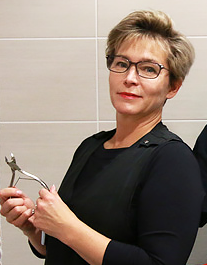Taitaja competition challenges the teacher’s vocational and pedagogical competence
In the article Ritva Kipinä, a Beauty Care teacher from Valkeakoski Vocational College, talks about how vocational competence is developed through skills competitions.
This article is a short version of a blog post that was originally written for a project Skills for Wellness. In the article Ritva Kipinä, a Beauty Care teacher from Valkeakoski Vocational College, talks about how vocational competence is developed through skills competitions. Kipinä will work as the head judge of Beauty Therapy in the Finnish national skills competition Taitaja in May 2021. The article was originally written by a Hairdressing and Beauty Care teacher Janika Reunanen from Sataedu.
Ritva Kipinä first explored Taitaja, the Finnish national skills competition, in the 1990s when Beauty Care got its own skill to the competition, Beauty Therapy. Through the years, Kipinä has had many roles in skills competitions. For instance, she has worked as a judge, a supervisor, and as a coach in Taitaja. In addition, she worked as a supervisor in WorldSkills Helsinki in 2005. She has also visited skills competitions in Finland and abroad multiple times.
skill to the competition, Beauty Therapy. Through the years, Kipinä has had many roles in skills competitions. For instance, she has worked as a judge, a supervisor, and as a coach in Taitaja. In addition, she worked as a supervisor in WorldSkills Helsinki in 2005. She has also visited skills competitions in Finland and abroad multiple times.
How has skills competitions developed your own expertise as a vocational teacher?
By participating in the Taitaja competition I challenge my own vocational and pedagogical competence. I get a chance to see different ways of implementing learning methods, how the vocation changes and develops, to test my own competence, and to network with the different experts in the field. The benefits can also be seen in the practical work of vocational teaching.
How does Taitaja increase vocational competence in Beauty Care?
The Taitaja competition increases knowledge on the diversity of work tasks and competence requirements in Beauty Care. The examination of the field specific evaluation points and criteria makes us wonder if in vocational education and training we consider the things affecting the work in the field as comprehensively as we could. One example in Beauty Care is ergonomic working and hygiene. By taking the new or changing requirements into consideration in vocational education and training the services offered at workplaces also develop. By improving the quality of vocational education and training we also get better quality work at workplaces.
How does participating in the competition benefit the student?
The student who participates in the competition will get training and coaching for the competition. Individual coaching enables the student’s competence to be developed to an even more professional level. By challenging your own competence and demonstrating it in the competition, you gain self-confidence which will carry to the future. Participation improves field specific competence but especially other transversal skills which are needed in the future working life and life in general. By having the Taitaja competition in your CV you gain activity points and improve your chances of finding employment. Operators from different fields visit the Taitaja competition, so it is also possible to get to know potential employers in the field.
Usually the student has good memories from the Taitaja competition, even if they didn’t win.
Why, in your opinion, are skills competitions needed?
Taitaja competition is the biggest marketing event for vocational education and training. Some of the future professionals choose their careers by watching the competitors’ work. Marketing events such as the Taitaja competition are needed to give young people information about different types of work tasks and future possibilities. Field specific development requires networking and new innovations for the ways how the tasks are implemented.